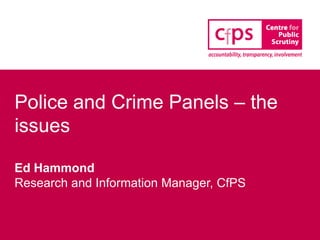
W19 preparing for police and crime panels - ed hammond
- 1. Police and Crime Panels – the issues Ed Hammond Research and Information Manager, CfPS
- 2. Contents PCPs – their proposed role and powers Key implications for scrutiny What councils should consider in preparing for May 2012
- 3. Proposed role and powers The PCP will hold the elected commissioner to account (but not the Chief Constable) It will be a formal committee of a council in the Force area, but must also consist of councillors from other authorities and some lay members It will be able to examine the delivery of the Police and Crime Plan but its powers of veto will be limited Government have described it as a “scrutiny body”. It will be resourced through extra funds in the policing grant
- 4. Key scrutiny implications Composition – executive or non-executive? Powers – are they enough? How will the PCP work with other bodies – CSP partners, CSP scrutiny committees? Will its role focus on holding to account after the event or will it have a broader remit to assist in policy development? How will it act on neighbourhood policing issues?
- 5. Issues for councils to consider Transitional issues: Should a “shadow PCP” be established? Can we be sure of anything until the Bill gets Royal Assent? What will happen in Wales? Any lessons for England? Operational issues: How will national/local protocols defining co-operation influence the PCP and how it works? The need for strong links with local scrutiny functions Business planning and where the PCP can most effectively add value